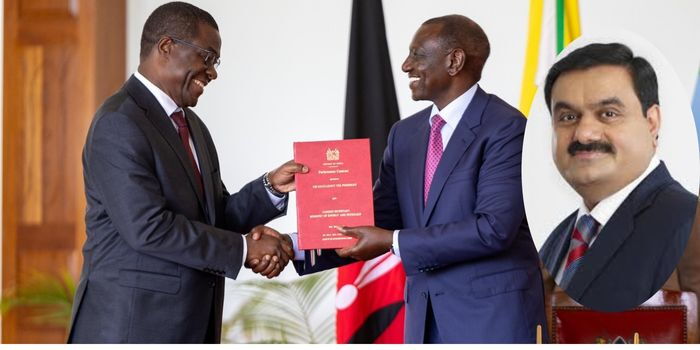Energy Cabinet Secretary Opiyo Wandayi(left) with President William Ruto during the signing of Ministerial Performance contracts on November 19, 2024, at State and an insert photo of Adani Holdings Group owner Gautam Adani.
Kenyan Government Faces Minimal Expense After Terminating Adani Deal
The Kenyan government is poised to incur only a small expense following its withdrawal from a high-profile deal with Indian conglomerate Adani Holdings. This announcement comes as the search begins for a new private partner to replace Adani.
President William Ruto’s declaration on Thursday that Kenya would exit all agreements with Adani sparked questions about the financial consequences of terminating the near-finalized deal with the Kenya Electricity Transmission Company (KETRACO).
Treasury Cabinet Secretary John Mbadi addressed these concerns, clarifying that the Privately Initiated Partnership (PIP) procurement arrangement in place ensures no significant losses. He emphasized that only a deposit had been paid to Adani, which will be refunded.
Despite these assurances, the government must navigate a complex three-step process to formally terminate the agreement. This procedure includes settling verifiable costs, which could prolong the resolution but ensures proper accountability in ending the partnership.

A photo collage of Gautam Adani (left) and President William Ruto
Minimal Costs Expected as Kenyan Government Seeks to Terminate Adani Deal
The Kenyan government anticipates incurring minimal costs in its termination of the KETRACO-Adani Energy deal, with the only major verifiable expense being payment for environmental assessment reports.
John Mativo, Managing Director of KETRACO, explained that reimbursing the cost of Environmental Impact Assessments (EIAs) was part of the agreement. “Any verifiable costs, such as Environmental Assessment Reports, can be reimbursed. The law also provides a cap for such payments, which works in the government’s favor,” Mativo noted.
Environmental Assessment Costs
In Kenya, the cost of an EIA typically ranges between 0.1% of the total project cost, with a minimum of Ksh10,000. For the Ksh96 billion project involving 372 kilometers of transmission lines, EIA costs could go up to Ksh96 million. However, these costs remain subject to the interpretation of clauses in the agreement between KETRACO and Adani.
Next Steps in Termination
KETRACO is preparing a detailed report to Adani outlining the reasons for the withdrawal. In response, Adani may:
- Demand Reimbursement: Request payment for incurred EIA costs and other verifiable assessments.
- Mutual Withdrawal: Opt for an amicable exit from the deal without additional demands.
The government, however, could argue against reimbursing the full EIA costs by citing insufficient documentation provided by Adani during due diligence.
Allegations Against Adani
The situation is further complicated by external factors. On Wednesday, Adani Group founder Gautam Adani and seven associates were accused by U.S. authorities of paying Ksh34 billion in bribes to Indian officials—allegations the group has strongly denied.
The unfolding developments highlight the complexities of public-private partnerships and the government’s cautious approach to safeguarding public resources while adhering to legal obligations.
